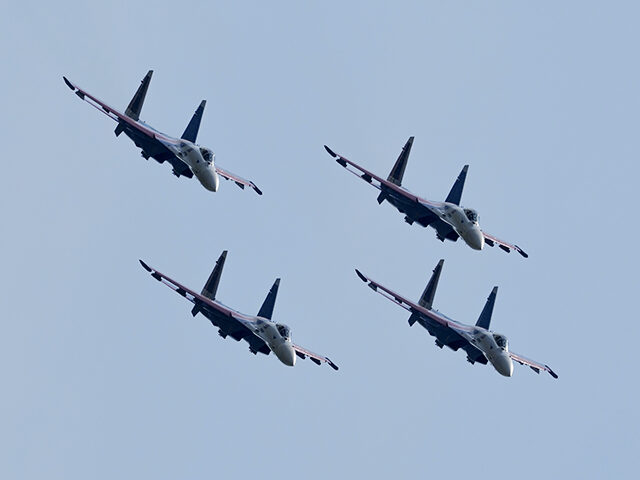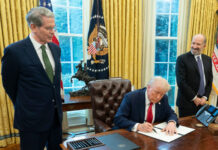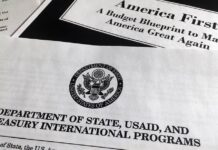A Russian government document obtained by Reuters on Friday showed military spending doubling to over $100 billion for 2023 as the invasion of Ukraine grinds on. The document offered some concrete evidence that Russia might not be able to afford the war for much longer.
As Reuters pointed out, Moscow no longer makes “sector-specific budget expenditure data” public, so the document – whose provenance the report was rather coy about – offers the outside world a rare glimpse of the balance sheet for the Ukraine invasion.
The numbers do not look good, as the published budget goals for 2023 envisioned defense spending as roughly 17 percent of all government spending, but the actual number is over 37 percent of expenditures and climbing.
The war has not crashed Russia’s finances yet because military spending is a form of economic stimulus – but eventually, the treasury runs dry, and titanic government debt begins to crush the economy. Americans have been learning that painful lesson slowly, but the hurting will come faster in the much smaller and less robust Russian economy:
Rising war costs are supporting Russia’s modest economic recovery this year with higher industrial production, but have already pushed budget finances to a deficit of around $28 billion – a figure compounded by falling export revenues.
Higher spending on defense, as Moscow prosecutes what it calls a “special military operation” in Ukraine, could widen the deficit further, while the boost in output could cannibalize other sectors and crowd out private investment.
Funding for schools, hospitals and roads was already being squeezed this year in favor of defense and security, but as the share of defense spending grows, other areas could face cuts.
Analysts told Reuters the Russian military-industrial complex is effectively “running at full capacity,” while civilian industrial production is slowing down. As CentroCreditBank economist Yevgeny Suvorov put it, other sectors are “hemorrhaging” staff as the military economy devours skilled workers.
Russia’s income from oil proved more robust than Western planners anticipated when sanctions were first imposed, but that charmed era may be coming to an end.
The Russian Finance Ministry reported in July that oil and gas revenues fell by 47 percent in the first half of 2023, causing the government’s budget deficit to rise 17 percent more than originally projected for the entire year. Russia’s energy industry relies on some very expensive targeted government subsidies, so a cycle of collapse could begin as plummeting oil revenues and rising war costs make those subsidies unaffordable.
Locko-Invest head of investment Dmitry Polevoy predicted Russia will suffer a “rapid economic slowdown” once the money for “fiscal steroids” dries up and military spending is no longer a net stimulus to the economy.
Of course, the burden of maintaining Ukraine’s defense is a massive fiscal burden for Kyiv and its allies too, including the cost of maintaining economic sanctions against Russia.
The Wall Street Journal (WSJ) on Wednesday was less optimistic that Moscow will lose the money war, noting that on both the real-world and spreadsheet battlefields, titanic Western spending has only been able to achieve a “stalemate” against Russia.
The Biden White House glibly predicted sanctions would “cut Russia’s economy in half” after the invasion of Ukraine began, but Russian GDP shrank only 2.1 percent in the first year of the war, and will grow by 1.5 percent this year, even though Russia is “the most sanctioned major economy in the world.”
Nothing about the sanctions regime has worked as the Biden administration predicted:
When they were unveiled, the sanctions were described by Biden administration officials as the most consequential in history, and the initial shock and awe roiled Moscow’s financial markets. But today the economy has muddled through enough for the Kremlin to support an attritional war that the U.S. had hoped to avoid.
Sanctions initially starved Russia of microchips and high-tech components last year, crimping its ability to produce precision-guided missiles. But since then Moscow has found loopholes through neighboring countries, and is bombing Ukraine daily with precision weaponry.
Russia’s crude oil continues to flow, even if the lower prices it fetches have hit state coffers. Analysts say that the main effect of sanctions—technological backwardness and an inability to modernize—will hamper its economic growth in the longer term.
The military budget document reviewed by Reuters might be a bit more gloomy than the situation described by the WSJ’s correspondents a few days earlier, but the bottom line is that Russia’s strategy of using military production as economic stimulus to balance the impact of sanctions – and relying on a few key trading partners and shadowy shipping networks to avoid the worst of those impacts – is still working for the moment.
Interestingly, the Reuters and WSJ analyses agreed on one key point: Russia’s great near-term weakness is a growing shortage of labor.
“Russia is suffering its worst deficit since the 1990s as emigration and wartime mobilization sap workers from companies – a trend only expected to worsen due to the country’s poor demographic outlook,” the WSJ observed.




